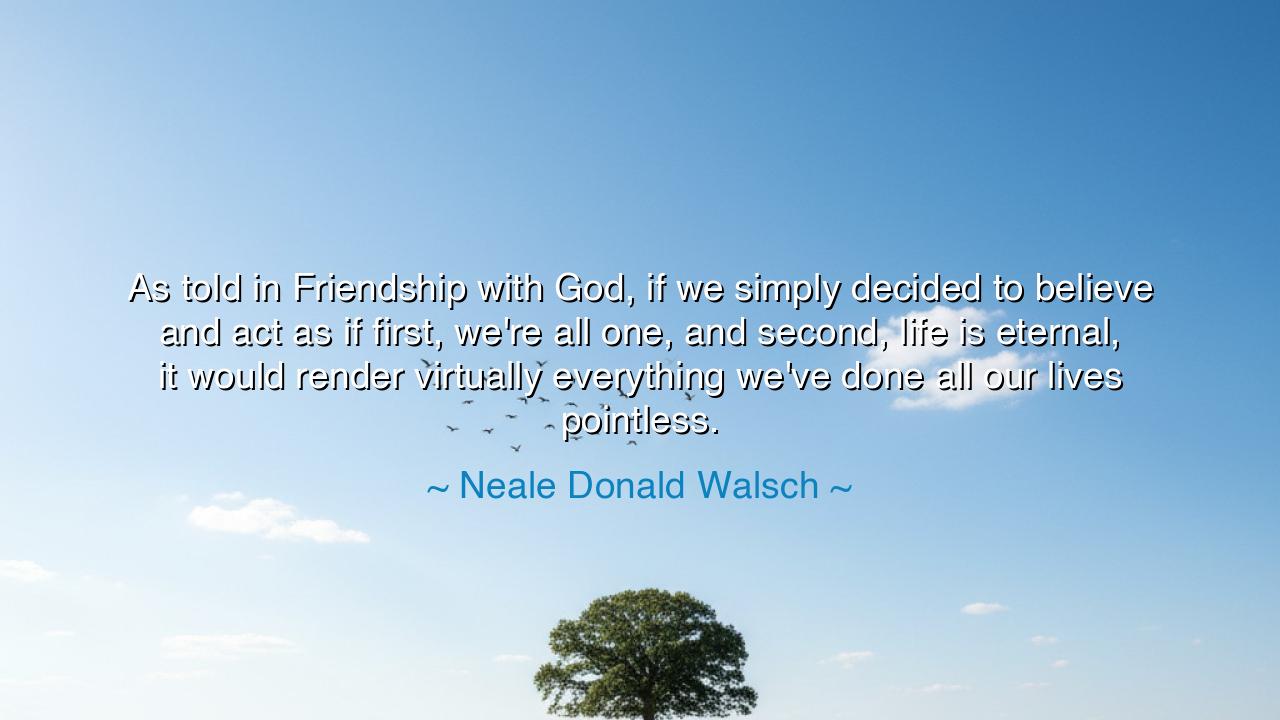
As told in Friendship with God, if we simply decided to believe
As told in Friendship with God, if we simply decided to believe and act as if first, we're all one, and second, life is eternal, it would render virtually everything we've done all our lives pointless.






"As told in Friendship with God, if we simply decided to believe and act as if first, we're all one, and second, life is eternal, it would render virtually everything we've done all our lives pointless." — Neale Donald Walsch
In the great span of human existence, where men and women seek meaning in the fleeting moments of their lives, there lies a profound truth at the heart of all spiritual teachings. Neale Donald Walsch speaks of a simple yet transformative belief: that if we truly accepted the idea that we are all one, and that life is eternal, it would change everything we have done, and indeed render much of what we do, in the eyes of eternity, pointless. This is not to say that our actions are meaningless, but that when we begin to understand the greater truth—that we are not separate, but interconnected, and that our lives are not finite, but part of a continuum—the weight we place on the material and the transient begins to dissolve.
For millennia, the great philosophers and spiritual teachers have spoken of the unity of all things. Plato, in his dialogues, suggested that the soul is not confined by time and space, and that true wisdom comes when one understands the unity of all being. Similarly, the Buddha taught that samsara, the cycle of life and death, is a mere illusion. True liberation comes when we see beyond the separateness of the world and understand the interconnectedness of all life. Walsch, in his teachings, echoes this timeless wisdom—that if we truly embraced the belief that we are one, and that life transcends this earthly existence, then much of our striving and suffering would fade into the illusion it truly is.
To say that life is eternal is to recognize that time itself, in the grandest sense, is but a fleeting moment in an endless river of existence. Look to the example of Socrates, who faced death with unshakable courage, believing that the soul would transcend his earthly body and continue its journey. Socrates' acceptance of death did not diminish the value of his life; rather, it gave him a deeper sense of peace and purpose. He was not burdened by the finite nature of his physical existence but saw himself as part of an eternal truth. If, like Socrates, we embraced the eternity of life, we might also see our actions in a new light, not as something to be desperately achieved before our time runs out, but as part of a greater unfolding that is not bound by the limits of this life alone.
Yet, what would it mean to truly live as though we are one? To live as though all of humanity, indeed all of existence, is a single expression of the same divine source? Imagine a life where competition, greed, and separation fall away, and the only measure of success is how much we contribute to the collective good. Imagine a world where we see others not as separate individuals, but as reflections of ourselves. Sages of every tradition have taught this: to see the divine in all things, to understand that compassion, love, and kindness are the true paths to freedom. By acting as if we are all one, we would no longer strive to build walls between us, but bridges, connecting our souls in a shared journey toward peace and understanding.
This unity, coupled with the belief in the eternity of life, would indeed transform our perception of all that we do. The pursuit of material wealth, the endless climb for status, the frantic race to achieve and acquire, would all seem small in comparison to the infinite nature of existence. The ego, that incessant need to be recognized and validated by others, would lose its hold on us, as we would no longer see ourselves as isolated entities, but as part of a much grander design. In this light, the work we do would shift from a mere effort to fulfill personal desires to a noble act of contributing to the greater good, knowing that what we do here ripples through eternity.
Let us take the wisdom of Walsch to heart and reflect upon the choices we make in our own lives. Are we living as though we are separate, driven by personal ambition, or are we living as though we are one, guided by the wisdom of unity and the knowledge that our lives are part of an eternal cycle? The true power lies in the shift in consciousness—the shift from seeing ourselves as isolated beings, struggling for meaning in a fleeting world, to understanding that we are part of an interconnected whole, where our actions today resonate in eternity.
In the end, the lesson of Walsch’s words is simple yet profound: to live with the belief that we are one and that life is eternal is to free ourselves from the petty concerns that dominate the lives of those who believe they are separate and finite. By living with this understanding, we elevate every act, every thought, and every word to the realm of the sacred. It is not that our lives become pointless, but that they become part of something much greater than we could ever imagine. The true meaning of our existence lies not in what we accumulate or achieve, but in how we embody unity, love, and compassion in every moment.






AAdministratorAdministrator
Welcome, honored guests. Please leave a comment, we will respond soon